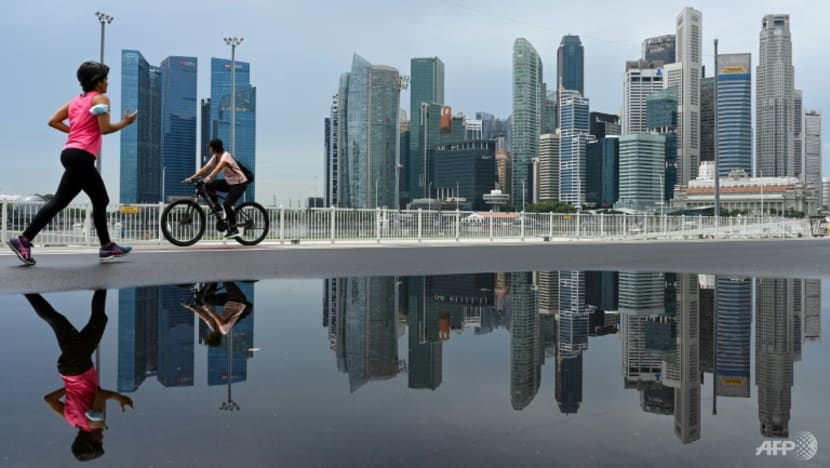Singapore shares reverse losses, bucking falls in Asia after US Fed delivers another big rate hike
Most Asian bourses traded in the red after the Fed announcement, as two other central banks in Asia followed through with rate hikes.

A backdrop of Singapore's central business district. (Photo: AFP/Roslan Rahman)
SINGAPORE: Singapore shares reversed earlier losses to end little changed on Thursday (Sep 22), bucking the sea of red in the region and overnight on Wall Street after the US Federal Reserve raised interest rates and signalled further hikes ahead.
The Straits Times Index (STI) finished at 3,263.07, up 0.04 per cent or 1.28 points, after having fallen as much as 0.39 per cent in early morning trade. Losers outnumbered gainers 257 to 230, as 1.02 billion securities worth S$1.09 billion changed hands.
“The tilt towards risk-off has dominated early market performance,” said OCBC’s chief economist and head of treasury research and strategy Selena Ling.
Banking stocks were among the day's heavily traded stocks in terms of value.
All three counters trimmed their losses towards the end of the trading session with DBS finishing little changed at S$33.52. OCBC shed 0.32 per cent, or S$0.04, to S$12.31, while UOB dropped 0.54 per cent, or S$0.15, to S$27.53.
Real estate investment trusts (REITS), which are sensitive to interest rate fluctuations given the impact on yield spreads and borrowing costs, were mixed.
Mapletree Logistics Trust and Suntec REIT declined about 0.6 per cent each, while Ascendas REIT advanced 0.36 per cent.
Inflight caterer and ground handler SATS tumbled 5.13 per cent, or S$0.21, to S$3.88. The company had on Wednesday said it was in discussions to acquire air cargo handler Worldwide Flight Services, although no definitive terms or formal legal documentation have been agreed upon.
In the region, most stock bourses traded in the red, with MSCI's broadest index of Asia-Pacific shares outside Japan at its lowest since May 2020.
Japan’s benchmark Nikkei 225 index ended down 0.58 per cent after the Bank of Japan said on Thursday it would maintain its ultra-low interest rate and dovish policy guidance.
South Korea's Kospi index finished down 0.63 per cent, or 14.9 points, lower at 2,332.31, after falling as much as 1.62 per cent in early trade. The index marked the lowest close since Jul 15.
In Hong Kong, the benchmark Hang Seng Index dived 1.61 per cent, or 296.67 points, to 18,147.95. Earlier in the day, the Hong Kong Monetary Authority raised its base rate charged through the overnight discount window by 75 basis points. Hong Kong’s monetary policy moves in lock-step with the United States as the city’s currency is pegged to the greenback.
Two other central banks in Asia followed through with rate hikes on Thursday – the Bangko Sentral ng Pilipinas announced a well-anticipated hike in its benchmark interest rates by half a percentage point and Bank Indonesia raised its seven-day reverse repurchase rate by 25 basis points.
The Philippine stock market was last seen trading 0.63 per cent lower on Thursday afternoon, while Indonesia’s benchmark Jakarta Composite Index edged up 0.43 per cent.
Meanwhile, the Fed’s announcement also sent the US dollar up to a fresh two-decade high, hitting new records against currencies such as the euro, pound and the yen.
The Singapore dollar lost as much as 0.23 per cent against the greenback to hit 1.4203 - its lowest since April 2020 - earlier in the trading day. It has since clawed back to 1.4174 per US dollar by late afternoon.
A strong dollar is likely to persist as the Fed continues with its aggressive rate hikes, but monetary policy tightening efforts among most Asian central banks should help to limit the extent of depreciation among regional currencies, said Mr Tai Hui, chief market strategist for Asia Pacific at JP Morgan Asset Management.
Related:
A MORE HAWKISH FED
The US central bank announced its third consecutive interest rate increase of 0.75 percentage point on Wednesday, continuing forceful action to tamp down inflation that has surged to the highest in 40 years.
US stocks seesawed following the announcement and later finished the session in the red. The Dow Jones Industrial Average closed down 1.7 per cent at 30,183.78 on Wednesday. The S&P 500 slid 1.71 per cent to 3,789.93 and the Nasdaq Composite dove 1.79 per cent to 11,220.19.
Markets had been expecting another big interest rate increase, but were caught off guard by the Fed's outlook as far as the need for additional hikes.
The latest Fed statement included interest rate projections for the end of 2023 and 2024 that are higher than the previous forecasts, signalling that the US central bank now sees the need for a more prolonged monetary tightening cycle in light of inflation trends.
A "more hawkish narrative” by Fed officials underscores the central bank’s “willingness to sacrifice growth to get inflation lower”, said analysts from ING Economics while pointing to how officials have cut their forecasts for several economic indicators.
“The Fed is effectively acknowledging that a recession is coming, but inflation will not fall quickly and there will be a lot of pain,” they said in a note.
Globally, the outlook has also dimmed.
Sustained interest rate hikes, coupled with existing pressures such as Europe’s energy crisis and heightened geopolitical tensions, might put the global economy at risk of a recession within the next year, said TD Ameritrade Singapore’s chief executive Greg Baker.
WHAT THIS MEANS FOR INVESTORS OR HOME OWNERS
Mr Tai said the near-term outlook for equities will remain challenging amid the more hawkish path for interest rates. On the other hand, high-quality bonds with an intermediate to long duration may be more attractive within the fixed income space.
“The rate hike … (supports) our emphasis on portfolio stability and a more defensive stance on asset allocation. For Asia, the Fed’s outcome is also likely to keep pressure on risk assets in the near term, especially for export-oriented companies,” he said.
With major indices around the world reacting more sensitively to global macroeconomic indicators, Mr Baker said investors should keep their sights on the long term and maintain a diversified portfolio that can weather short-term market volatility.
In Singapore, short-term Singapore-dollar interest rates are likely to see further upward adjustments in order to keep pace with the hawkish US central bank, said OCBC’s Ms Ling.
“There could be more pressure emerging on property mortgage rates and refinancing costs for corporates going out into year-end and into early 2023,” she added.


















